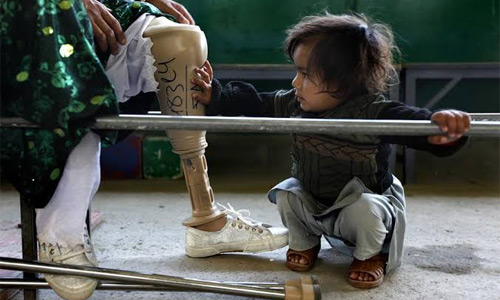After many years of insecurity and economic instability combined with rise of addition, Afghanistan is considered to be among the most dangerous geography for children and women! Unsurprisingly, the insecurity crisis and economic decline begin to inflict its first blows on the most vulnerable strata of the society such as women and children. Therefore, they are more subjected to extreme malnourishment, violence, health and poor education and they suffer from this situation more than any other group. As daily report indicates a large number of children die due to explosion and war related events. Yesterday, the United Nations Children’s Fund (UNICEF) said in its latest report that two million children under five and 485,000 pregnant and lactating women are severely deprived of health and food security.
Referring to the last years’ drought in Afghanistan, UNICEF said its impact would persist in 2019 affecting food security and endanger the lives of millions of women and children in the country. Children and women, especially lactating and pregnant women are the most vulnerable class in society that easily affected by insecurity, poverty and unemployment. Unfortunately, despite the demand of the Afghan people for peace and prosperity, each year their dreams are receded to improving the security and economic situation. The terrorist groups can target anywhere and anyone without any differentiation between and armed and civilians. So, it is not expected that the pain of health and hunger of children and women decrease without finding fundamental solution to political and security issues.
With passing every year, the issues of women and children are increasing mainly due to war related issues such as displacement, addiction and lack of accessing to health services. The UNICEF report says that 550,000 people were in severe need to urgent help in 2018, while 3.6 million people needed foodstuff. It predicts that 6.3 million people would need humanitarian assistance in 2019 in Afghanistan. According to the UNICEF, 600,000 children in Afghanistan are at risk of acute malnutrition and children who are acutely malnourished are 9 times more likely to die than other children. UNICEF called the children under age of five, pregnant and lactating women as the most vulnerable group of society against food shortage. These are not because of social indifferences it is the result of persistent war which made Afghanistan the worst geography for children and women. .
However, all the people of Afghanistan are affected by war, unemployment and drought, and their ordinary lives are completely destabilized but the agonizing lives of women and children are more affected by the general state of the society. Many social anomalies, such as theft, killing, suicide, social harassment, divorce and ethical deviation result from the same insecurity, war and extensive poverty while the right solution to these are not putting them in prisons. Thus, a variety of diseases and mental illnesses are newly appearing due to chorionic food insecurity and mental discomfort.
The death rates of women and children cannot be analyzed separated from the security, political and economic factors. As a whole, the situation of the society will not improve as long as there is no positive change in general political and economic condition of the country. As the whole country is suffering from war and poverty, no citizen including women and children would have satisfactory life. Nearly seventy percent of people in Afghanistan are suffering from psychological problems, and a significant part of the population is struggling with a variety of physical illnesses. More than fifty percent of people live below the poverty line. In this case, it is not expected that lactating and pregnant women and young children who need especial care and attention are not faced malnutrition. When men are unemployed and unable to earn the necessary expenses for their families, it’s obvious that women and their children cannot enjoy healthy eating.
The widespread addition is another factor which imposes a lot of problems to women and children of the country. It is said that up to four or five million people are addicted in the country. When bread winner of a family addicted then he/she will not be able to work and provide food to their families. Eventually, they face dreadful fate; they also create a lot of social anomalies through thieving things from individuals, houses, markets and these have become very common in the community.
The fundamental solutions to treatments of malnourishment are not possible unless treat the political and economic issues in the county. The improvement of the living conditions of children and women depends entirely on the improvement of the household economy, and the improvement household economy is related to the situation of the whole country. Malnourishment is the direct consequence of poverty caused by insecurity, war, political instability and also weak economy.However, if we are not able to solve their problems strategically, we must not forget the urgent assistance. The international community should realize the critical condition of women and children in Afghanistan and have to urgently proceed for sending fiscal aid.
Finally, the long-lasting conflict continues to threaten the physical safety and health of Afghans, disproportionately women and children. We need to seek both temporary and strategic solution as mentioned. Meanwhile, attacks on civilian and civilian structures must be prevented because millions people live in conflict affected area with extremely constrained access to health services. In these areas, the maternal and child health remains dangerously overlooked due to persistent exposure to violence as well as severe natural drought.
Home » Opinion » Women and Children as the main victims of War in Afghanistan
Women and Children as the main victims of War in Afghanistan
| Mohammad Zahir Akbari

